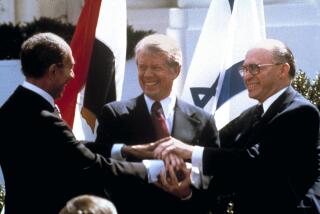The Bid to Eliminate World’s Chemical Weapons
- Share via
The Senate opens debate today on the international Chemical Weapons Convention, a treaty conceived during the Reagan administration and negotiated under President Bush.
The treaty’s purpose is to rid the world of toxic weapons, which have been included in military arsenals worldwide since the battlefield horrors of World War I but have seldom been used by one army against another since 1918. Japan and Italy used poison gas during the early days of World War II, and Iraq used it in the 1980s, but the attacks were against unarmed civilians.
So far, 70 nations have signed and ratified the pact. If the United States is to join them, two-thirds of the Senate--67 of the 100 members--must vote to ratify it. The vote is scheduled for Thursday.
The following is a briefing on the pact:
PROVISIONS
Under the Chemical Weapons Convention, each state agrees never, under any circumstances, to:
* develop, produce, otherwise acquire, stockpile or retain chemical weapons, or transfer them, directly or indirectly, to anyone
* use chemical weapons
* engage in any military preparations to use chemical weapons
* assist, encourage or induce anyone, in any way, to engage in any activity prohibited by the convention.
In addition, each state agrees to destroy all chemical weapons production facilities on its territory and to destroy chemical weapons that it either owns or has discovered abandoned on its territory.
VERIFICATION AND ENFORCEMENT
* The treaty establishes an international verification authority that will be empowered to conduct inspections, including surprise inspections, of any facility suspected of harboring chemical weapons in a country that has ratified the pact.
* The U.N. Security Council will be authorized to impose sanctions on violators--possibly including countries that do not accept the treaty.
* The convention also penalizes countries that do not join by denying them access to chemicals that could be used for chemical weapons, including many that have legitimate industrial uses.
* The convention imposes restrictions on export sales of chemicals by industries operating in countries that are not party to it.
SUPPORTERS SAY
* The treaty was an American initiative to begin with, and ratification is a test of U.S. leadership.
* The United States is destroying its stock of chemical weapons under a law passed by Congress, so the treaty requires nothing that was not being done anyway.
* The Pentagon’s array of conventional weapons, backed by nuclear arms, is so powerful that it serves as a greater deterrent to the use of chemical weapons than does the nation’s arsenal of chemical weaponry.
* Unless the United States ratifies the pact by April 29, it will be denied a seat on the authority that will verify and enforce the treaty.
* Unless the United States signs on by April 29, U.S. chemical companies will be subject to the export sanctions.
OPPONENTS SAY
* Eliminating U.S. chemical weapons would undermine their deterrent effect, a step that might increase the likelihood that chemical weapons would be used in warfare.
* The convention is unverifiable and unenforceable because chemical weapons can be produced by terrorists in tiny, clandestine laboratories likely to escape detection and because the U.N. Security Council is unlikely to invoke sanctions.
* The treaty requires signatories to share technical data, giving any country that ratified the pact for the purpose of cheating easy access to chemical technology it might not otherwise have.
* The treaty, by treating all countries alike, fails to acknowledge the special role of the United States in global security.
* Rogue states such as Iraq, Libya, North Korea, Sudan and Syria have not signed and remain outside the scope of the treaty.
More to Read
Sign up for Essential California
The most important California stories and recommendations in your inbox every morning.
You may occasionally receive promotional content from the Los Angeles Times.













